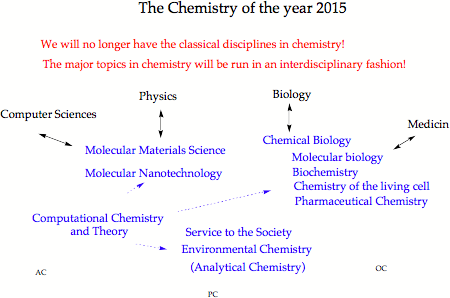The Grand Challenges for Chemists and Chemical Engineers
- Learn how to synthesize and manufacture any new substance (compact synthetic schemes, high selectivity, low energy consumption, benign environmental effects) – Synthesis and Manufacturing
- Develop new materials and measurements devices that will protect citizens (terrorism, crime, disease) against dangerous substances and organisms with high sensitivity and selectivity – Protection of the individual, analytical chemistry
- Understand and control how molecules react – over all time scales and the full range of molecular size (observation of molecules during reactions) – Computational Chemistry, Theory
- Learn how to design and produce new substances, materials, and molecular devices with properties that can be predicted, tailored, and tuned before production (use of chemical theory and computation) – Molecular design, Computational Chemistry
- Understand the chemistry of living systems in detail (assembling of biomolecules into functional complexes, chemistry of the living cell, chemistry of the brain) – Biochemistry
- Develop medicines and therapies that can cure currently untreatable diseases (drug design for cancer, viral diseases, ADME) – Drug Design
- Develop self-assembly as a useful approach to the synthesis and manufacturing of complex systems and materials (nanotechnology) – Materials science, Nanotechnology
- Understand the complex chemistry of the earth, including land, sea, atmosphere, and biosphere so we can maintain its livability (how to deal with pollution and other threats to earth) – Environmental Chemistry
- Develop unlimited and inexpensive energy (new ways for energy generation, storage, transportation) – Energy
- Design and develop self-optimizing chemical systems (copying the development of biological systems through evolution: medicines, catalysts) – Biomaterials, Materials Science
- Revolutionize the design of chemical processes to make them safe, compact, flexible, energy efficient, environmentally benign. – Chemical Engineering
- Communicate effectively to the general public the contributions that chemistry and chemical engineering make to society (use the media, give lectures) – Public Relations
- Attract the best and the brightest students into the chemical sciences – Education

